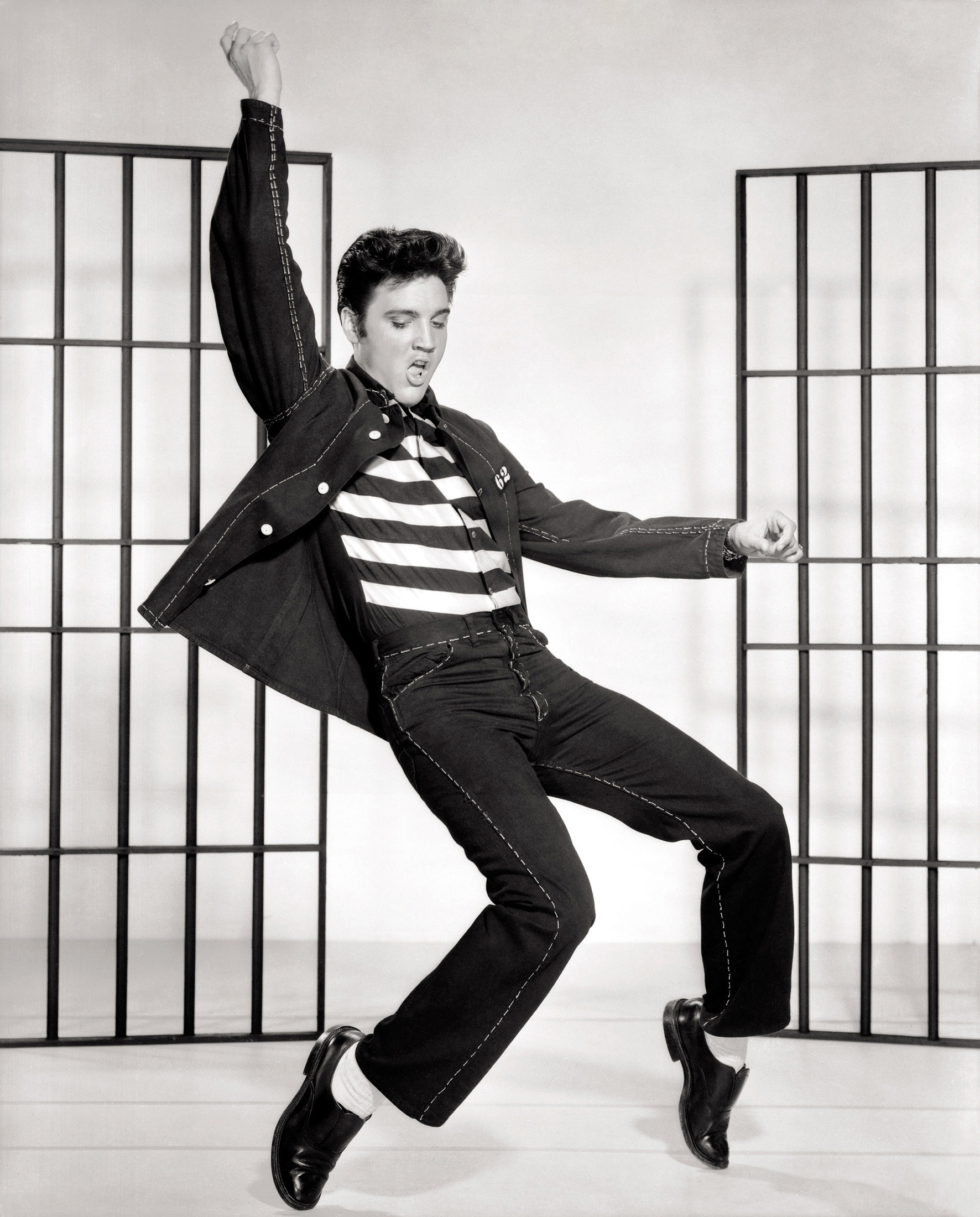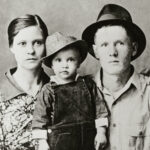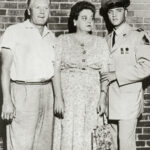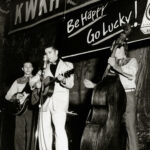
Before the Beatles in the 1960’s, the Rolling Stones in the 70’s, Michael Jackson in the 80’s, and well before the modern mega-stars like Beyonce, Taylor Swift and Ed Sheeran, there was “Elvis.” Elvis Presley is likely the most famous popular cultural phenomenon in the United States in the 20th century. And he is still very much a part of American culture. He is the “King of Rock-and-Roll.” His recording of That’s Alright Mama in 1954 is widely recognized as the “the big bang” of rock-and-roll. Without Elvis Presley, all the music that came after him would not have happened when it did or in the same way. Elvis contributed to the American fabric and changed the entire world with a cultural impact that could never be equaled. He created something new, something purely American that changed music forever across the globe. As John Lennon said, “Before Elvis, there was nothing.”
When Elvis burst onto the music scene, Elvis was considered controversial for his provocative movements on stage and staggering good looks, which included sideburns and what was considered “long” hair at the time. His first number one song, Heartbreak Hotel, was the first record to sell more than a million copies for RCA Records. He followed it up with seventeen number one hits in the years that followed. Some estimate Elvis has sold as many as one billion records worldwide. Elvis also made thirty-one films and spent years headlining in Las Vegas. Look him up. Listen to his evolving music from the 1950’s to the 1970’s and check out his movies. Elvis was and is a culture-changing phenomenon.
Sadly, Elvis’ contributions to music, culture and society are becoming less known and less understood. Instead, an image of an icon that barely resembles the real man is now left in place for many youth today. Most young people are aware of who Elvis Presley was and recognize his image, yet most are not familiar with his music. Upcoming generations only hear of his downfalls or the sensationalized stories of sex, drugs and rock-and-roll. His “bigger than life” persona overshadows his humanity. Most do not know how truly original he was or understand his “rags to riches” story. They are not unaware of just how giving the man was and how first and foremost, he saw himself as a provider. We intend to shine a light on those hidden places in the following pages.
 Elvis was born in Tupelo, Mississippi in 1935. He was born at home in a tiny two-room house. His twin brother was stillborn, and the family was so poor that the baby was buried in a cardboard box and placed in an unmarked grave. Elvis was on the receiving end of the community’s generosity quite literally from the day of his birth. The community came together and donated what the young couple needed to not only bury one son, but to take care of the surviving baby. Of course, there was little time to grieve. The Presley’s came from a long line of sharecroppers, and Vernon and Gladys (father and mother) had to get right back to the fields to pick cotton in order to put food on the table.
Elvis was born in Tupelo, Mississippi in 1935. He was born at home in a tiny two-room house. His twin brother was stillborn, and the family was so poor that the baby was buried in a cardboard box and placed in an unmarked grave. Elvis was on the receiving end of the community’s generosity quite literally from the day of his birth. The community came together and donated what the young couple needed to not only bury one son, but to take care of the surviving baby. Of course, there was little time to grieve. The Presley’s came from a long line of sharecroppers, and Vernon and Gladys (father and mother) had to get right back to the fields to pick cotton in order to put food on the table.
Eventually, the Presley family migrated to Memphis in the fall of 1948, leaving the cotton fields, Tupelo, and their Mississippi roots behind. Memphis was a big city located a couple of hours north and held at least some promise for a better life. Elvis, only thirteen years old, had not yet burdened himself with the responsibility of pulling his family out of poverty. He knew times were tough; everything he held dear in possessions and people fit into a beat-up, eleven-year-old, green Plymouth. His family had worked hard all their lives, yet they had few possessions. Looking back, Elvis described the scene:
We were broke, man. Broke. And we left Tupelo overnight. Dad packed all our belongings in boxes and put them in the trunk and on top of a 1939 Plymouth. We just headed for Memphis. Things had to be better.
But things did not get better for the Presley family, not for a long time. Dire poverty followed the Presley’s to Memphis. They spent the first year in boardinghouses and struggled to pay weekly rent. Billy Smith, Elvis’ cousin, remembers dumpster diving and a very limited diet, especially that first year.
We lived next to a vegetable stand … what produce they couldn’t sell, they threw out in the trash cans. I remember going through there and finding bruised bananas to eat because when you’re that poor, you scavenge for what you can get.
Finally, the family was selected for government housing. The Presley family lived in a tiny (698 square feet) two-bedroom Memphis apartment for four years. This was three years longer than he had lived in any one place in Tupelo. Elvis craved stability and, for that short period, he found it in that apartment. It carried some stigma, but it was a consistent home.
From the time that Elvis was young, he felt an enormous responsibility to provide for his parents and to pull them out of poverty. His mother remembered it well:
When he was hardly four, he’d tell me, ‘Don’t worry, Mama. When I’m grown up, I’ll buy you a big home and two cars.’ All his life he would say out loud what he was going to do for us, and he’d say it in front of other people. And you know, I believed him.
 Therefore, upon graduating from high school, Elvis gave serious thought to becoming an electrician. He believed that having a skilled trade would allow him, not only to take care of his parents, but also to support a family of his own. As it turned out, Fate had other plans for him. Young Elvis, like all rural Southerners, loved rockabilly music, a predecessor to rock’n’roll. Furthermore, he had been gifted with an acoustic guitar on his 11th birthday and he subsequently had won a high school talent show. So one day, on a break from his work, he stopped by Sun Records, a local recording studio, to drop one or two songs for his mother. And, with that proposed gift for his mother, Elvis’ life shifted in ways he never could have anticipated. When Sun Records released That’s Alright Mama, it became an instant hit below the Mason Dixon line. It wouldn’t be long before television would make Elvis Presley a household name.
Therefore, upon graduating from high school, Elvis gave serious thought to becoming an electrician. He believed that having a skilled trade would allow him, not only to take care of his parents, but also to support a family of his own. As it turned out, Fate had other plans for him. Young Elvis, like all rural Southerners, loved rockabilly music, a predecessor to rock’n’roll. Furthermore, he had been gifted with an acoustic guitar on his 11th birthday and he subsequently had won a high school talent show. So one day, on a break from his work, he stopped by Sun Records, a local recording studio, to drop one or two songs for his mother. And, with that proposed gift for his mother, Elvis’ life shifted in ways he never could have anticipated. When Sun Records released That’s Alright Mama, it became an instant hit below the Mason Dixon line. It wouldn’t be long before television would make Elvis Presley a household name.
A typical twenty-one-year-old might opt for a bachelor pad for himself and a small home for his parents, but Elvis’ vision included his whole family living comfortably and securely together. So just as soon as he could, he made it happen. With Elvis’ growing fame came increasing spendable wealth, and he could give his family that home of his dreams. It was a mansion named Graceland and that purchase was a defining moment for the Presley family. It certainly was one of Elvis’ proudest and most satisfying lifetime achievements. These were the same people who struggled their entire lives. The same people who rarely had a shack to call their own and bought pillows ‘on time’, were now pulling up to a mansion in the then-countryside outside of Memphis—a mansion they would all call home. This financial leap must have seemed incomprehensible in so many ways. Everyone they had ever known — generation after generation — lived in poverty. Now the Presleys were part of this unfamiliar world of wealth, fame and privilege:
We were poor when I was coming up, real poor… My Mama and Daddy have made a lot of sacrifices for me, June. You can’t imagine how good it makes me feel to be able to do something for them now. They really had it rough, but thank God, not anymore! Well, yes. We’ve gotten quite a bit of stuff. I mean, nothing real big. I’ve got them anything that I think they might want. I’ve gotten Daddy some suits, and Mother goes to town now, and she buys anything she wants, which makes me feel real good.
From the age of nineteen onward, Elvis would become the sole breadwinner and support for his immediate family. Over time, he included many of his kin. For example, paternal grandmother Minnie Mae Presley who had been living with the family for years. In those days she had been sleeping on a cot in the kitchen of the boarding houses or on a small bed in the corner of a shared room. Minnie May soon was followed by other kinfolk — close or distant, real or fictive — who came from dismal backgrounds similar to his own. Over the years, Elvis provided for close to twenty family members at any given time, with many living at Graceland.
Now, as Elvis’ fame grew, so did the entourage of guys Elvis kept around him, a group the press affectionately called the, “The Memphis Mafia.” Elvis provided for them too. In fact, not being able to ask people to leave became a problem for Elvis over the years. After all, if ten people could fit in a sharecropper’s one-room shack, then any given number of people could fit in Elvis’s mansion at any given time. He felt he was lucky to have earned so much money and he wanted to share it.
Elvis was thrilled to have his parents and grandmother under one roof, even if the newfound wealth was difficult for all of them to comprehend. Elvis defined financial success as “having enough to help others.” He felt money had a purpose, therefore stockpiling it in the bank was never his intention. He wanted to buy what he needed and desired, and he wanted to provide for his family and friends. It is not legend, but rather fact, that he also loved giving it away. Elvis had felt helpless his entire life whenever he felt judged by people with money.
Indeed, Elvis’ caretaking generosity extended well beyond his family, friends, and fans. For example, Elvis gave away over 100 Cadillacs in his lifetime. Why? Elvis knew what it was to be poor and helpless. “Elvis never forgot the experience of being in poverty, ever. It stuck with him all his life,” stated his ex-wife, Priscilla. As a close friend to Elvis in later years, Sammy Davis Jr. knew this to be true as well. Sammy was originally offered the Mac Davis tune “In the Ghetto” but he turned it down. “In all authenticity, I can’t do this song because I haven’t lived this,” recalled Sammy Davis Jr. He continued, “But I’ll tell you who did, Elvis Presley.”
So, in his lifetime Elvis Presley gave cars, jewelry, homes, money and countless other items to friends and strangers alike. For example, he once saw a young girl walking a bike down the road because of a flat tire. He took the girl to a bike store for a new bike and then dropped her back home. Elvis also read in the newspaper of a fundraiser for a new wheelchair for a disabled woman. He found out where the woman lived and personally delivered a new wheelchair to her.
 Elvis’ deep sense of responsibility came at a terrible personal cost. For one thing, he could not stop his over-the-top pace of work because he was being driven by his desire to provide financially for his family and friends. In addition, Elvis continually felt a responsibility to never disappoint his fans. His need to serve led to a number of poor choices. He never rested when his body demanded rest. “When we were on the road tours, I sometimes wouldn’t know what state and city I was in,” recalled Elvis’ nurse, Tish Henley Kirk. “We were in a different town all the time. And I wasn’t up there doing the shows and wearing myself out like he was.”
Elvis’ deep sense of responsibility came at a terrible personal cost. For one thing, he could not stop his over-the-top pace of work because he was being driven by his desire to provide financially for his family and friends. In addition, Elvis continually felt a responsibility to never disappoint his fans. His need to serve led to a number of poor choices. He never rested when his body demanded rest. “When we were on the road tours, I sometimes wouldn’t know what state and city I was in,” recalled Elvis’ nurse, Tish Henley Kirk. “We were in a different town all the time. And I wasn’t up there doing the shows and wearing myself out like he was.”
Life on the road wore Elvis out, and when he was not touring the country, he hosted consecutive concerts in Las Vegas. “Instead of working maybe five nights a week and two nights off for a couple of weeks, like Frank Sinatra and everybody else did, he worked for four weeks, seven nights a week, and two shows a night,” recalled Memphis Mafia member Red West. He also began to self-medicate so that he could continue to perform at the powerful level to which his fans had become accustomed. But when those close to Elvis would plead with him to slow down and take time off, he would reply “I can’t (take time off). Too many people rely on me.”
Horribly, what no one knew at the time, no doubt including Elvis, was that he had several unrecognized medical disorders, many of them since his birth. He also had other medical disorders that had remained unrecognized and untreated. And his lifestyle was killing him.
Elvis was his own worst enemy at times, but he did the best he could. He simply wanted to continue being “Elvis Presley.” That is, he needed to be able to provide for extended family, friends, and fans at all costs. Unfortunately, this lifelong character trait of accepted responsibility was not tempered by the trait of prudence.
Elvis examined his own frailty as a human being in a 1961 interview when he was only twenty-six years old: “I look at myself strictly as a human being that has been very lucky, but whose life… can be snuffed out in just a matter of seconds… I am not anything supernatural or better than any other human being.” As it later turned out, Elvis was right; He was both lucky and human. He achieved fame and notoriety achieved by few others and, in doing so, shifted the cultural universe. Yet, being human, his life ended when he was only 42. It happened in a matter of seconds, on the morning of August 16, 1977. Looking back with today’s medical understanding, it is much easier to understand his early death. His intense lifestyle and self-medication did not mix well with his congenital birth defects and medical issues. His body just threw in the towel. It could not function at that pace any longer.
However, even in death, Elvis is still doing what he set out to do: provide for his family and friends. His archived works and financial investments still provide for his descendants and associates. As evidence of his fame today, a 2016 album, blending Elvis’ voice with the Royal Philharmonic Orchestra was released. Forty years after his death, the album went straight to #1 on the charts. In 2022, the movie “Elvis” also was number at the box office. His legacy — including Graceland — still brings a steady stream of tourists to Memphis each year. Graceland is the third most visited building in America, attracting 650,000 visitors annually.
Discussion Questions
- Describe the conditions that Elvis grew up, first in Tupelo and then in Memphis?
- What profession did Elvis plan on having when he graduated high school?
- According to Elvis, why did he start singing and why did he continue singing?
- When he became rich and famous, how did Elvis provide for his family? For his friends? For his fans?
- What inspires you about Elvis Presley and how can his life make you a better person?

Pingback: Elvis Presley – Responsibility – Kevin Mauermann's WordPress Site
1. very bad conditions
2. electrician
3. because he liked it
4. 1930s
5. He was cool and worked hard.
1. Very poor, dumpster dive for food.
2. Electrician/trade
3. Winning a talent show when he was little and recording a couple songs for his mom
4.got a house for his family to stay in, bought his dad some suits, and his mom could shop in town for whatever.
5. To be more selfless than greedy, learned to put family first